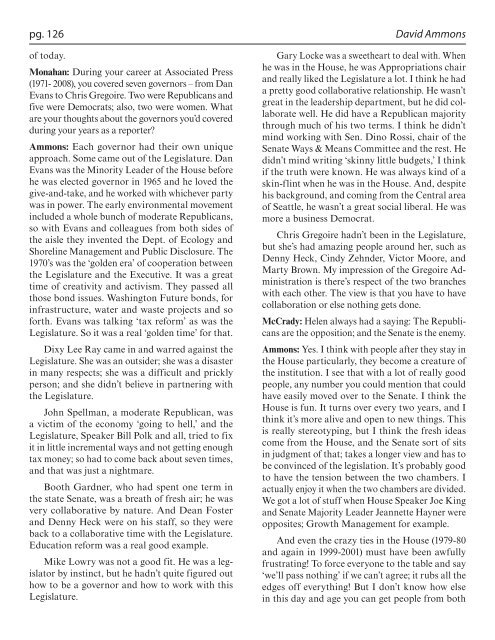Helen Sommers: An Oral History
Helen Sommers: An Oral History
Helen Sommers: An Oral History
You also want an ePaper? Increase the reach of your titles
YUMPU automatically turns print PDFs into web optimized ePapers that Google loves.
pg. 126 David Ammons<br />
of today.<br />
Monahan: During your career at Associated Press<br />
(1971- 2008), you covered seven governors – from Dan<br />
Evans to Chris Gregoire. Two were Republicans and<br />
five were Democrats; also, two were women. What<br />
are your thoughts about the governors you’d covered<br />
during your years as a reporter?<br />
Ammons: Each governor had their own unique<br />
approach. Some came out of the Legislature. Dan<br />
Evans was the Minority Leader of the House before<br />
he was elected governor in 1965 and he loved the<br />
give-and-take, and he worked with whichever party<br />
was in power. The early environmental movement<br />
included a whole bunch of moderate Republicans,<br />
so with Evans and colleagues from both sides of<br />
the aisle they invented the Dept. of Ecology and<br />
Shoreline Management and Public Disclosure. The<br />
1970’s was the ‘golden era’ of cooperation between<br />
the Legislature and the Executive. It was a great<br />
time of creativity and activism. They passed all<br />
those bond issues. Washington Future bonds, for<br />
infrastructure, water and waste projects and so<br />
forth. Evans was talking ‘tax reform’ as was the<br />
Legislature. So it was a real ‘golden time’ for that.<br />
Dixy Lee Ray came in and warred against the<br />
Legislature. She was an outsider; she was a disaster<br />
in many respects; she was a difficult and prickly<br />
person; and she didn’t believe in partnering with<br />
the Legislature.<br />
John Spellman, a moderate Republican, was<br />
a victim of the economy ‘going to hell,’ and the<br />
Legislature, Speaker Bill Polk and all, tried to fix<br />
it in little incremental ways and not getting enough<br />
tax money; so had to come back about seven times,<br />
and that was just a nightmare.<br />
Booth Gardner, who had spent one term in<br />
the state Senate, was a breath of fresh air; he was<br />
very collaborative by nature. <strong>An</strong>d Dean Foster<br />
and Denny Heck were on his staff, so they were<br />
back to a collaborative time with the Legislature.<br />
Education reform was a real good example.<br />
Mike Lowry was not a good fit. He was a legislator<br />
by instinct, but he hadn’t quite figured out<br />
how to be a governor and how to work with this<br />
Legislature.<br />
Gary Locke was a sweetheart to deal with. When<br />
he was in the House, he was Appropriations chair<br />
and really liked the Legislature a lot. I think he had<br />
a pretty good collaborative relationship. He wasn’t<br />
great in the leadership department, but he did collaborate<br />
well. He did have a Republican majority<br />
through much of his two terms. I think he didn’t<br />
mind working with Sen. Dino Rossi, chair of the<br />
Senate Ways & Means Committee and the rest. He<br />
didn’t mind writing ‘skinny little budgets,’ I think<br />
if the truth were known. He was always kind of a<br />
skin-flint when he was in the House. <strong>An</strong>d, despite<br />
his background, and coming from the Central area<br />
of Seattle, he wasn’t a great social liberal. He was<br />
more a business Democrat.<br />
Chris Gregoire hadn’t been in the Legislature,<br />
but she’s had amazing people around her, such as<br />
Denny Heck, Cindy Zehnder, Victor Moore, and<br />
Marty Brown. My impression of the Gregoire Administration<br />
is there’s respect of the two branches<br />
with each other. The view is that you have to have<br />
collaboration or else nothing gets done.<br />
McCrady: <strong>Helen</strong> always had a saying: The Republicans<br />
are the opposition; and the Senate is the enemy.<br />
Ammons: Yes. I think with people after they stay in<br />
the House particularly, they become a creature of<br />
the institution. I see that with a lot of really good<br />
people, any number you could mention that could<br />
have easily moved over to the Senate. I think the<br />
House is fun. It turns over every two years, and I<br />
think it’s more alive and open to new things. This<br />
is really stereotyping, but I think the fresh ideas<br />
come from the House, and the Senate sort of sits<br />
in judgment of that; takes a longer view and has to<br />
be convinced of the legislation. It’s probably good<br />
to have the tension between the two chambers. I<br />
actually enjoy it when the two chambers are divided.<br />
We got a lot of stuff when House Speaker Joe King<br />
and Senate Majority Leader Jeannette Hayner were<br />
opposites; Growth Management for example.<br />
<strong>An</strong>d even the crazy ties in the House (1979-80<br />
and again in 1999-2001) must have been awfully<br />
frustrating! To force everyone to the table and say<br />
‘we’ll pass nothing’ if we can’t agree; it rubs all the<br />
edges off everything! But I don’t know how else<br />
in this day and age you can get people from both
















